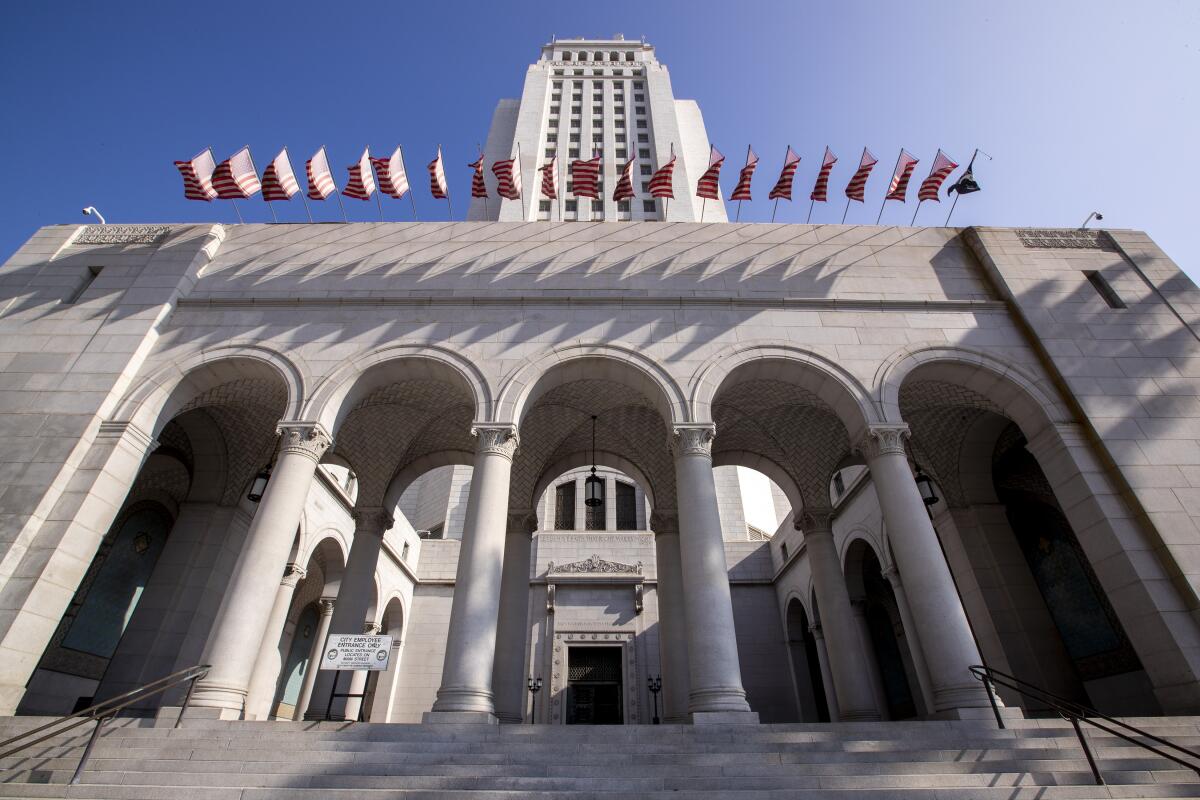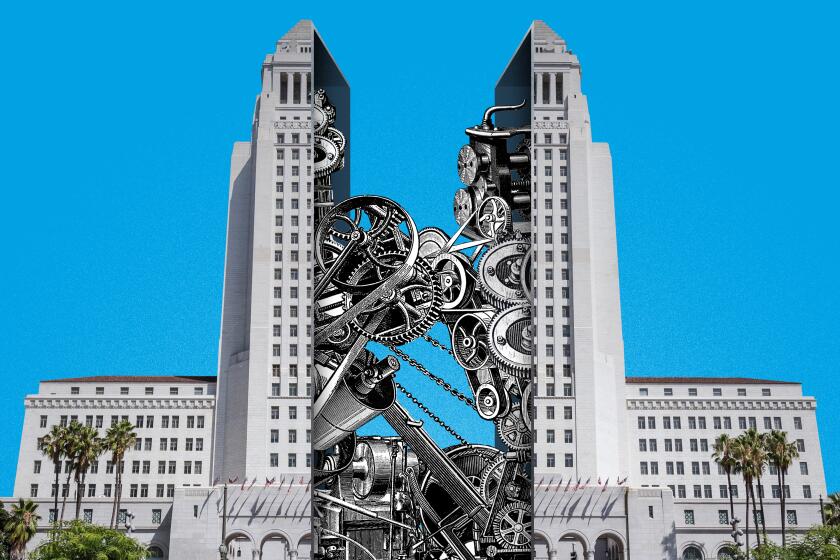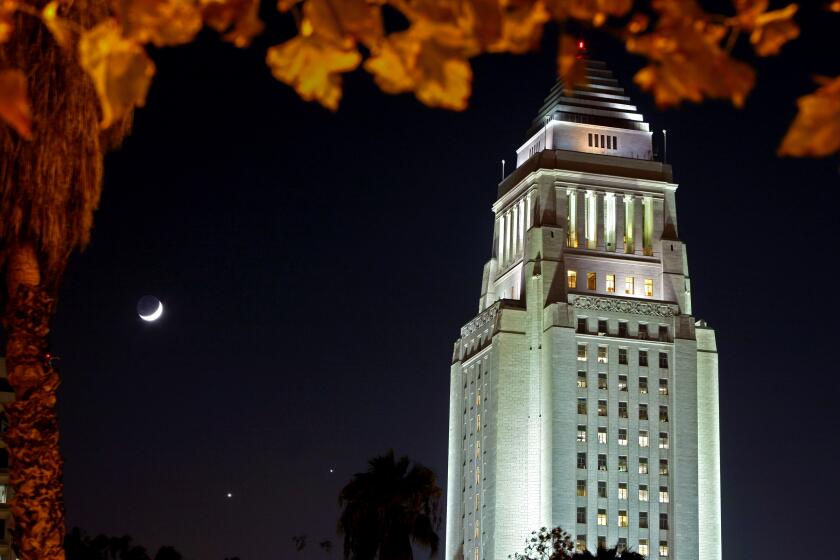Why is the ethically challenged L.A. City Council obstructing the Ethics Commission?

- Share via
The scandal-plagued, corruption-prone Los Angeles City Council has struck again. You’d think a body that has had four members charged with corruption in three years would be eager to demonstrate its commitment to ethics and government oversight.
But last Friday, without any public discussion or reason given, the council unanimously rejected a seemingly well-qualified nominee to the Ethics Commission, which is the watchdog over the city’s elected officials.
It’s rare for the council to block a nominee to a city commission — appointments are typically approved without controversy. It’s even more unusual when the nominee has widespread support from neighborhood councils: Jamie York is a member of the Reseda Neighborhood Council and advocate for ethics and political reform who has worked in the past on political campaigns and as a fundraiser. She was nominated to the commission by City Controller Kenneth Mejia.
Fixing City Hall
Los Angeles City Hall has been rocked by scandal after scandal, but now there’s momentum to reform city government.
What makes this rejection especially galling is that the failure to fill the seat makes it impossible for the Ethics Commission to do its work, which includes enforcing campaign finance, contracting, lobbying and conflict of interest laws. The commission canceled its August meeting and will not be able to decide enforcement cases or move forward policy proposals because there are three vacancies on the five-member panel.
The mayor, city attorney, controller, council president and council president pro tempore each get to choose a commissioner, and the full council confirms the appointments. Council leadership hasn’t nominated commissioners for their two open seats (one has been open since December). Those vacancies along with York’s rejection mean the commission does not have a quorum to conduct business. The council must fill its two positions immediately.
As for the York nomination, there were no concerns raised publicly or privately with Mejia or York. At the council meeting on Friday, there no discussion, just a vote to disapprove the nomination initiated on the floor by Councilmember Monica Rodriguez and seconded by Councilmember Marqueece Harris-Dawson.
It shouldn’t take a scandal to get Los Angeles’ political leaders to embrace basic ethics reforms — like requiring lobbyists to say they are lobbyists at public meetings.
In the days after the vote, some information has trickled out. On Tuesday, Council President Paul Krekorian said in a statement that he had reservations about appointing an outspoken advocate to the Ethics Commission — a quasi-judicial panel that makes enforcement decisions and metes out penalties when elected officials and candidates run afoul of ethics laws. The controller “certainly should have known that the job of an Ethics Commissioner is fundamentally different from that of an advocate,” Krekorian said.
York said she was told that organized labor groups lobbied against her appointment in part because she led the push for stronger regulations over — wait for it — lobbying by labor unions and others.
There was indeed a behind-the-scenes push from labor to oppose York, according to council staff. Asked about his vote against York at a neighborhood council meeting Monday, Councilmember Hugo Soto-Martínez said he didn’t support her because she opposes efforts to exempt union employees from having to register as lobbyists, Knock L.A. journalist Jon Peltz reported.
A long-overdue update of L.A.’s lobbying law could let unions avoid tight campaign finance and conflict of interest restrictions by lumping them in with charitable nonprofits.
That labor groups were able to quietly kill an Ethics Commission appointment with no debate or discussion speaks to the power and influence of labor in L.A. politics, which is exactly why York and the Times editorial board oppose exempting union leaders from the more stringent lobbying disclosure rules.
If council members were concerned about York’s position on this issue, they should have aired those concerns publicly before taking the vote. Or at least given Mejia and York the opportunity to respond. Instead, the nomination was summarily tanked with no transparency.
This only builds the case for giving the Ethics Commission more independence from the politicians it’s supposed to regulate. There are too many examples of elected officials manipulating or trying to suppress the Ethics Commission. The City Council and mayor control the commission’s budget, which determines the size of its staff of investigators and enforcers. In 2018, a former Ethics Commission staffer filed a whistleblower complaint after being told by commission management that a council member had threatened to cut the department’s budget if it didn’t soften rules on gifts for politicians, according to a Times story.
The City Council can also refuse to act on the commission’s recommended changes in ethics law. The Ethics Commission has been trying for 15 years to pass revisions to the city’s lobbying law to make paid advocacy more transparent and the rules easier to enforce. The council repeatedly refused to consider the proposals, and they died.
The commission itself has recommended a dozen changes to the City Charter that would give it more independence, including setting a minimum budget so politicians can’t cut funding to pressure ethics staff. The LA Governance Reform Project, a group of political science scholars, has also recommended giving the commission power to bypass the City Council to put proposed policies on the ballot for voters to decide.
The latest controversy shows it’s time to reconsider the size and appointment process for commissioners. Other cities, such as Long Beach, have some ethics commission seats reserved for nonpolitical appointments who are not chosen and confirmed by the people they regulate.
For all the talk from City Council leaders that they’re pro-reform, incidents like this is more evidence that L.A.’s political culture is broken and needs a complete overhaul.
More to Read
A cure for the common opinion
Get thought-provoking perspectives with our weekly newsletter.
You may occasionally receive promotional content from the Los Angeles Times.












